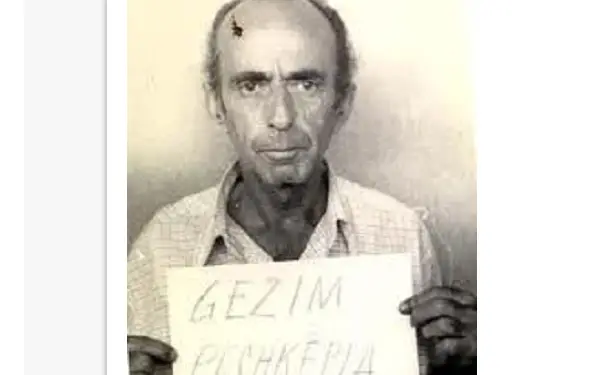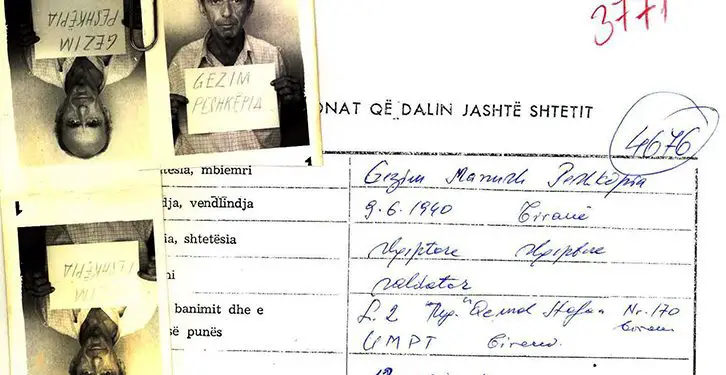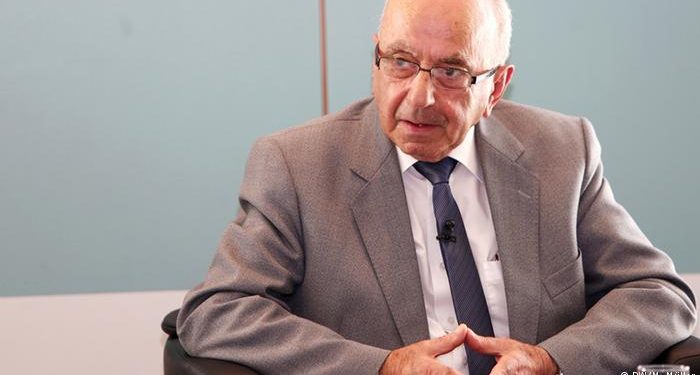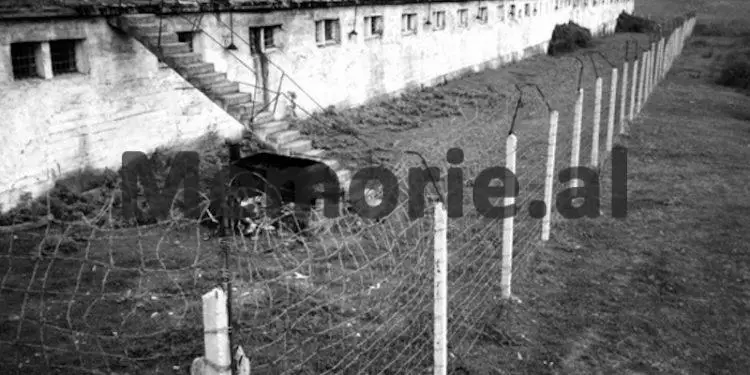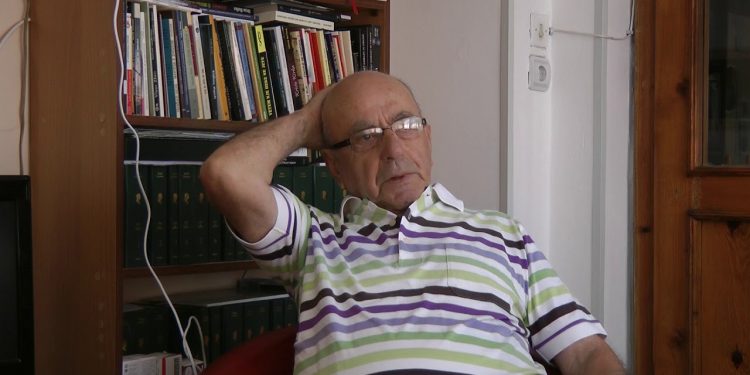Dashnor Kaloçi
Memorie.al/ publishes the unknown memories of the former political prisoner, Gëzim Peshkëpia, originally from Gjirokastra and living in Germany, where he recalls and describes in detail some of the events and stories of his accomplices in the camps and prisons of the communist regime of Enver Hoxha, such as: Professor Ismail Farka, Shefqet Kau, Eqerem Kavaja, Shaban Reçi, Halil Laze, Seit Bathorja, etc., with whom he spent years serving his sentence, as well as investigators, officers, captors and police officers serving in those “re-education wards”.
“Seit Bathoren was called out to the prison command offices where after being informed of the news of his release, after his sentence had ended, Commander Sami Kamberi told him:” From now on, Seit, you are free. Since it is late and there is no train, “I will escort you to Ballsh to sleep at the hotel and leave for Tirana early tomorrow with the first train. Do you have anything to say?” Usually this was done to crochet the formula required by the case, where the political prisoner being released had to reply: “Thank you to the Party that put its hand on my heart for me.” But Seiti did not utter that word, he looked the commander in the eye and said, “I have a prayer, Mr. Commander, but I do not know if you will be able to fulfill it.” “Speak,” replied the commander, and Seiti said, “Mr. Commander, if you want, let me stay here today in prison with my comrades, because I want to talk and get upset with them.” “Commander Samiu, originally from Peshkopia, stepped down, as he had a life to do with that job and had never been forced to ask any convict to stay in prison longer than the sentence he had.” The above is an excerpt from Gëzim Peshkëpi’s memoirs, which belong to the period when he was serving his sentence as an “enemy of the people” in the camps and prisons of Enver Hoxha’s communist regime, which Gëzim describes as one of the most interesting of his cycle of memories, (which he intends to title: “Humor in prison”) where he described some of the strangest characters he knew during the years of serving his sentence, he offered it exclusively for Memorie.al
Who is Gëzim Peshkëpia?
Gëzim Peshkëpia was born in 1940 in the city of Tirana, while his family originates from Gjirokastra. During the period of the Bird Monarchy, many boys from the Peshkëpia tribe were educated and graduated from various universities abroad. During the occupation of the country, 1939-’44, almost the entire Peshkëpia tribe sided with the nationalist forces, joining the “National Front” organization and Gëzim’s uncle, Nexhat Peshkëpia, was one of the main exponents of that organization. and one of the compilers of the famous ten-point Ball Decalogue. While at the end of 1944, Nexhat Peshkëpia fled Albania from the revenge of the communists, Gëzim’s father, Manush Peshkëpia, a few years later, in 1951, was arrested for the bombing incident at the Soviet Embassy and shot without trial. along with 21 other innocent intellectuals. Based on the family biography, for several years Gëzimi could hardly work as a teacher and was sent to serve as a teacher in the most remote villages of Lushnja, Kavaja and Durrës, always being under the surveillance of the State Security, as the son of the “enemy of the people,” who had been shot by the Party. As a result of the class struggle, Gëzimi was fired from his education and worked as a painter, welder and even as a poultry farmer in the subsidiary economies of the enterprise. This continued until 1975, when Gezimi himself was arrested and sentenced to eight years in political prison, accused of agitation and propaganda in the field of Art and Culture, a sentence he served mainly in Ballsh prison. With the opening of the embassies in July 1990, Gëzimi, together with his wife and two children, left for Germany, settling in the town of Soest, where he lives and currently lives with his family. During these years he lives in Germany, has worked as a teacher and as a clerk in the state administration of the district Kreisarchiv. Also, during this period, he has established connections (twinings) of the city of Soest with various cities in Albania, mainly in the field of Medicine and social. One of those cities that he has helped the most through the connections and acquaintances he has in Germany, is Kavaja, for which he has special spiritual connections. Throughout all these years, he has worked to raise the awareness of the German public towards the Albanian issue and in the German city of Soest, he organized one of the largest demonstrations that took place in the West, in support of the Kosovo problem in 1998. On the 60th anniversary of his birth, in 2000, he was awarded the title “Pride of the City” by the Kavaja City Council, while in Germany, the municipality of Soest hosted a reception at the city museum on that jubilee occasion. Gëzim Peshkëpia is also known as a publicist and poet, publishing numerous articles in the Albanian press inside and outside the country, mainly in the newspaper “Bota sot”.
Memories of Gëzim Peshkëpi
March 30, 1976. After 6 months of investigation I was on trial. For two weeks I was in the “old prison”. I was taken out of the dungeon and with my hands outstretched they led me to the gate to take me out into the yard. I stretch out my hands out of the carrier gate, and a policeman ties my irons. The gate opens and I enter the bus directly without seeing anything else, not even the yard. We take to the streets and head to the nearby court. As soon as I get off, I am greeted by Palluqja (one with mental health problems), who with a very authoritative hand sign says: walk fast! As soon as I walk out into the courtyard, I see people flocking, while a police fence with automatic weapons in hand, became barricades in the middle of the courtyard. I remembered that they were honored to meet me and I did not like it, I felt afraid that Kadri Ismailati’s threats, for “half the lek at the foot of Dajti” were becoming real! The farce that was probably taking place according to the script required this decor. The director had plenty of experience. It was nothing to do with the fantasy of the insurance to make me: “chairman of the intelligence group in the service of the CIA.” Then exemplary punishment (capital) for the mayor while for others “The party put its hand on the heart” and was given 15-25 years of isolation for “re-education”. With these thoughts I reached the inner gate of the courtyard, where the accompanying policeman took me by the arm and led me into the first hall on the left. These actions were done so quickly that I could only see my uncle, while the other flu faces, I could not register. I tried to grasp a single word to understand this unusual situation, but neither the silence nor the two policemen – guards – said anything to me. Here finally came a police officer, who told the guards to kick me up. They replied that they were in the right room, but he, after showing you the torn door, said: Do you not see? These have been done by the villagers of Seit Bathore, which had the trial at 9 o’clock and has now been postponed to tomorrow.
The prisoners I knew at 313
It was the first time I had heard of Seit Bathoren, and I do not know why I was impressed by the long conversation with the police, that he must have been a seven-year-old man with a stern look, like that of a brave warrior. From the police, I did not care what they were talking about, I learned that Seiti, being one of the first partisans with Myslym Peza. Three days later my second trial took place and after I was sentenced, one fine morning I was taken out of the dungeon, put on the bus and sent back to the new prison. There I could have passed through 4 gates and finally, I found myself in a yard surrounded by caracol where I saw twenty people, from whom were formed 3 pairs that walked up and down while the others warmed up in the sun in “Pajtos “. I knew Professor Ismail Farka, with whom he had passed the Theoretical Mechanics exam, a friend of mine. Then I spotted Pauline, the brother of my childhood friend, Aldos. Paulini had been a speaker on Radio Tirana, for the Russian language. Meanwhile, a red-faced policeman named Rustem once checked my briefcase and body clothes, allowing me to pass the white “warning” visa, saying: ‘join the herd now’! The others put their lips to the gas, as if everyone knew Rustem’s humor, who although insulting, was still better accepted than Ndue’s rudeness, or Ali’s sternness. I dropped the bag under the wall and as soon as I looked up, I saw the Dragon, an officer I had as front-line officer in my neighborhood block. I could hardly adapt. His greeting: ‘You took it, Gëzim’, confused me badly because I immediately remembered that he had come for an inspection. The ones that brought me to myself were the boots without boots, which ended up in a pair of torn socks, adorned with prison slippers. I noticed that the hat also had a red stripe star. They were almost all known only that each face needed some focusing and retouching, as they had been transformed by long isolation. After a while, Çeti arrived, (Shefqet Kau) Haxhiu, (Çira) Eqeremi (Kavaja), with a word “the womb of Saint Mary”! There were also surprises. People came to us whom we did not know had been arrested. Started a conversation, humor and even songs that continued until after midnight, in that room 6 x 3 m. which was called “Kaush.” Three-story beds were formed with planks. We managed to sleep in this area up to 33 people, reaching a record in population density per area across the globe!
Who was Seit Bathorja?
As soon as I got upstairs, a middle-aged man approached me and said to me in the Tirana dialect: ‘You are Joy’? How much money did Refi (Estref Kërçiku) do for you! He kept you in mind all day. We were in a dungeon with him. Yes, we had a good time. “Do not be upset, byrazer, because it is not wise to keep all of us inside,” he added with an innocence. Schweik. The man who was talking to me, I learned that his name was Seit Bathorja. “Are we old friends? I have come a hundred times to your house. “Thankfully, he came to see me on the day of the trial,” Seiti said, recalling that my uncle had been an apostate for him that day in court. Seiti’s biography was not very common. at this age he had killed the blood, that is, the killer of his father, and then left for Peza, joining Myslym Peza, as he had friendship with the local sheikhs. he showed simply without embellishments, without making any additions as many people were accustomed to. ” Their people know me and do not want to know the order of the Party. I killed Seiti say. Now they are calling me an enemy of the Party. “By God, tell me who I am friends with now,” Seiti told me?
Seit’s arrest
In Kaush we joined 16 people who had been arrested on 18 October. Seiti was arrested that day in the “name of the people”. Seiti did not understand at all that he was being arrested and told me: “Do you know that saleswoman, do you have the pastry of the New Bazaar? you have solutions. She laughed and finally accepted. On Saturday I was happy to put the gold cup in my small pocket and I was going straight to the pastry shop. As soon as you got around the round of “Avni Rustemi”, I came across a car that was wasted. The door opened and the man I took to inform him said: hop o Seit! Conversing and asking me, at last they came down to me in a yard. of the people, you have been arrested! I swear to you, that the people did not know anything. I said! Vallaji nji, or brother I do not have anymore. Vallahi nji, or brother I do not have! Break the turrets! “He told me that the needles did not rot.” This is how Seiti described his arrest.
Seit Investigator
“Which investigator did you have?” I asked? And he continued his confession: “Njanin vallahi. Loshka (Aliosha) was called. He was a store with him. He was typing, I did not speak at all. Then since I did not know how to write, called a policeman and he signed, while I put my finger in. He always chatted: tak-tak, ta-ta taktak and gave it to his hair (Seiti imitated it with an injured hand that could not collect it) and the policeman massaged the firm, I put my finger back in the dungeon. the first one came to me laughing because he said to me: “My name is Loshka. We will work together. “Well, vallahi, I waited, but I have my hands full from the war and I cannot do any kind of work. Even in the cooperative I was holding the box. From the investigation window I saw that some people were working in the prison. I remembered that he was talking about working there, and he was talking about confusion. Hey, oh, confuse Loshka to kill a pig!
- Dy accusation (act-accusation) made me Loshka. Refi read to me. (Estref Kërçiku)
- The first time I allegedly said that 20 planes like the English ones make Tirana ashes.
- The second time you do Loshka 200. What about mor Ref, I said, do these planes fly like this or like?
We prisoners laughed heartily especially when Seiti told the story of Tom, an Albanian-American, with whom they had spent a few months together in the dungeon during the investigation.
- “Tomi, or byrazer, had come from America like a tortoise, a blacksmith. One night he had been to the bar of the church of St. Procopius, eating dinner. he wore a suit, did the workers have cars, and such other tales. The poor Tom had told them without lies, but without coming down well from the church hill, they had shaved him… They had taken all the conversations by radio straight to the Security. Day and night, they did not rest and you asked about Cien. The Cia today, and the Cia tomorrow, made you the toy toy of the desert. “Again, about Cia they asked you o brother?” Yes more, these have made a fool of themselves. I’m an ordinary citizen, sir, and they ask me about agencies. “Did you go with him, tell him more, because in the end they will not kill him. “There was a bitch, while the CIA’s brother wished he had danome and asqer, hy-hy what it was he did not mind the seeker”, Seiti told about his cellmate.
That day they came to Seit to meet relatives. As soon as he entered, he opened the sacks and invited with his generosity all those who had in the bucket. You rejoice and your face brightens when you see others eating hungry. “Hey heck oh work, you are throwing me the goods of partisanship” -laughed Seiti./Memorie.al
Continues tomorrow




